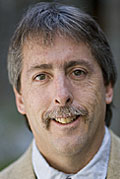Political shifts, human rights and the impact of immigrants on the U.S. economy will be examined in Lawrence University’s 2011 Povolny Lecture Series in International Studies “Latin America: Past, Present and Future.”
Kenneth Roberts, professor of government and the Roberts S. Harrison Director of the Institute for Social Sciences at Cornell University opens the five-part series Thursday, April 7 with the address “Free Markets and Troubled Democracies: Understanding Recent Political Trends in Latin America.” The presentation, at 7 p.m. in the Wriston Art Center auditorium, is free and open to the public.

A scholar on the political economy of development, political representation and the politics of social inequality in Latin America, Roberts will examine the contradictory political and economic development patterns in Latin America and discuss how they relate to the trends toward political democracy and market liberalization that re-aligned the region’s politics — and its relations with the U.S. — at the close of the 20th century.
While Latin American governments have been historically more stable, more democratic and more respectful of human rights in recent times, political party systems are in disarray in much of the region, leading to support for anti-system populist leaders. Underemployment and inequality also remain sources of political unrest. Over the past decade, support for U.S.-backed free market economies has eroded and political shifts have led to the election of leftist presidents in 10 countries, representing nearly two-thirds of the regional population.
Roberts, who earned his Ph.D. from Stanford University, has conducted grant-funded research in Chile, Peru, Venezuela and Argentina. He is the author of the book “Deepening Democracy? The Modern Left and Social Movements in Chile and Peru” and serves on the editorial boards of the journals Latin American Research Review and Latin American Politics and Society.
Joining Roberts on this year’s series are:
• Jake Frederick, assistant professor of history, Lawrence University, “”Discovered and to be Discovered – The Creation of Latin America,” April 14, Wriston auditorium, 7 p.m.
• Alexander Wilde ’62, senior scholar, Woodrow Wilson International Center for Scholars, Washington, D.C., “Argentina and Chile: Democratic Transition and Human Rights,” April 19, Wriston auditorium, 7 p.m.
• Juan Carlos Romero Hicks, governor of Guanajuato, Mexico, “U.S.-Mexican Relations: A Mexican Perspective,” May 6, Thomas Steitz Hall of Science 102, 4:30 p.m.
• Sarah Bohn ’99, research fellow at the Public Policy Institute of California, “Mexican Immigrants and the U.S. Economy,” May 9, Wriston auditorium, 7:30 p.m.
In conjunction with this year’s lecture series, a Latin America-themed film series will be shown in the Warch Campus Center cinema at 7:30 p.m.. Dates and titles are as follows:
• April 12 — “Walt y El Grupo” (Walt and The Group) USA, 2008.
• April 26 — “Matar a Todos” (Kill Them All) Uruguay, Argentina, Chile, 2008.
• May 3 — “Amores Perros” (Love’s a B*tch) Mexico, 2000.
• May 10 — “Divine Horsemen: The Living Gods of Haiti” Haiti, 1985.
The “Latin America: Past, Present and Future” lecture series is sponsored by the Mojmir Povolny Lectureship in International Studies. Named in honor of long-time Lawrence government professor Mojmir Povolny, the lectureship promotes interest and discussion on issues of moral significance and ethical dimensions.